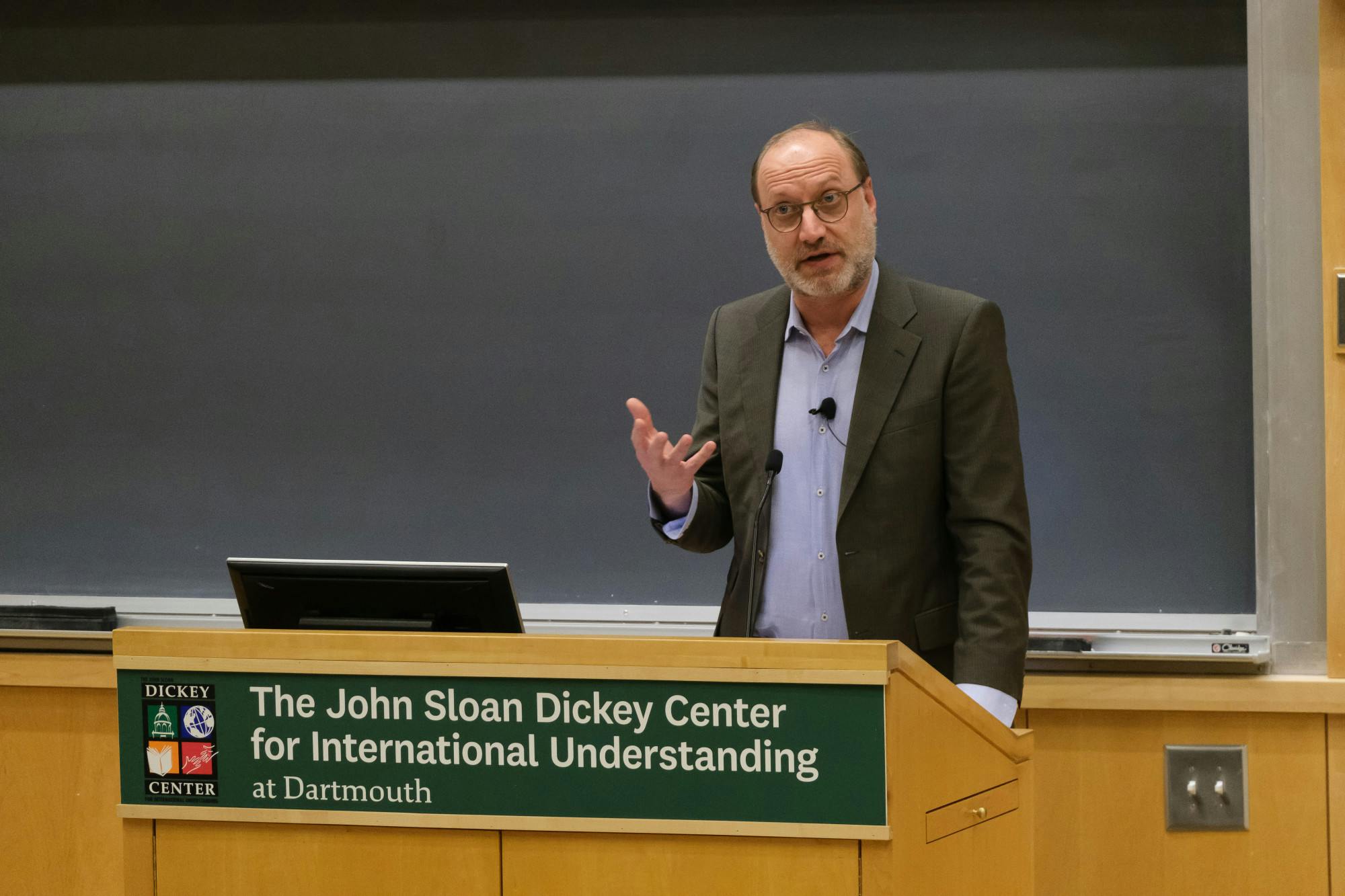On Feb. 13, University of Texas, Austin history professor Yoav Di-Capua and Boston College political science professor Jonathan Laurence gave a lecture titled “The Arab world and the Demise of the Caliphate” as part of The Dialogue Project. The event was introduced by visiting professor and former president of Kosovo Atifete Jahjaga.
According to its website, The Dialogue Project is a sub-initiative of Dartmouth Dialogues, which was created by College President Sian Beilock this year. The event is part of the Middle East Dialogues, which is the project’s first in a special topics series “encompassing courses and events related to timely, challenging topics,” according to the Dartmouth Dialogues website.
Jahgaga opened the event by discussing the process of nation-building that was set in motion by the fall of the Ottoman Empire after World War I. She emphasized the secular, multiethnic nature of her home country of Kosovo, suggesting that tolerance is the key to a stable future for the region.
“We need to reaffirm our commitment to building a future based on tolerance, based on dialogue, based on the use of respect and based on coexistence where the diversity of a region, religion or community is celebrated as a source of strength rather than a source of division,” Jahgaga said.
Di-Capua and Laurence both drew on their historical knowledge to discuss the Middle East today, emphasizing that understanding the history of the region is essential to understanding the current conflict between Israel and Gaza.
In his lecture, Laurence explained that the disappearance of a consensual, Islamic sovereign left a power vacuum and made it unclear who would protect Muslims worldwide. Laurence said this event has led to the emergence of various non-state actors, including extremist Abu Bakr al Baghdadi.
According to Laurence, British and European empires replaced centuries-old Islamic religious leaders with their own allies, scarring Muslim populations’ relationships with Western governments and impoverishing Islamic knowledge for generations. Laurence cited the disputes over Islamic holy sites, such as the Al-Aqsa mosque in Jerusalem.
According to Qatari news outlet Al-Jazeera, the mosque, which is currently policed by the Jordanian-affiliated Islamic Waqf, is one of Islam’s three holiest sites. Control of the mosque has long been a flashpoint in Israeli-Palestinian relations. Instances of perceived disrespect of the grounds by Israeli officials have led to violence in recent decades.
Di-Capua discussed how, in the aftermath of World War I, which included food shortages, mass migration, sectarianism and genocide, new political projects spread all across the Arab world.
“The modern Arab state is built on this destruction,” Di-Capua said.
Di-Capua added that upheaval led to a time of “moral reconstruction” when followers of Islam were forced to reckon with how their religion would come across to youth.
The two speeches were followed by a conversation between the professors about the fragmented nature of Islam and the tensions over the many groups and state actors, such as Iran, competing for influence in the religion. After the conversation, the audience asked questions about Palestinian statehood and ISIS, the Islamic terrorist group that emerged in Syria and Iraq.
Regarding the former topic, Laurence suggested that the formation of a Palestinian state isn’t impossible. “Nation states have been born of such crises before,” he said.
In an interview after the event, Middle Eastern studies department chair and professor Tarek El-Ariss spoke about the Dartmouth Dialogues initiative and the important role it will play in educating students about the history of the current conflict in the Middle East.
El-Ariss emphasized the need not just to bring in speakers with experience in today’s Middle East, but also to explore the context and history of the conflict.
“We are at a university that’s providing us with the resources to understand and reflect… to imagine the future in ways that now, we are unable to do because of the dark tunnel we’re in,” he said.
El-Ariss also noted the “long-standing collaboration” that exists between the Middle Eastern studies and Jewish studies programs at Dartmouth, saying that he believes it is this partnership that has allowed students “to engage and deal with what happened recently and bring the community together.”




